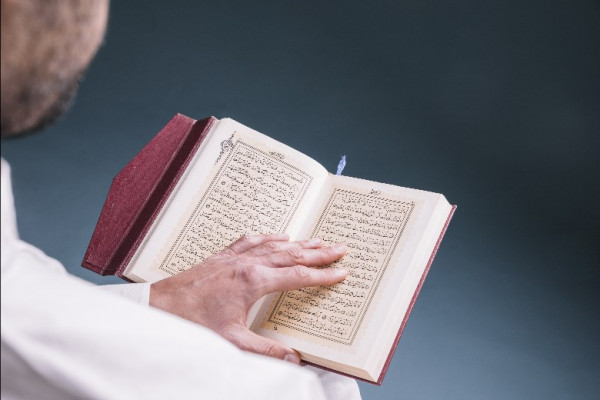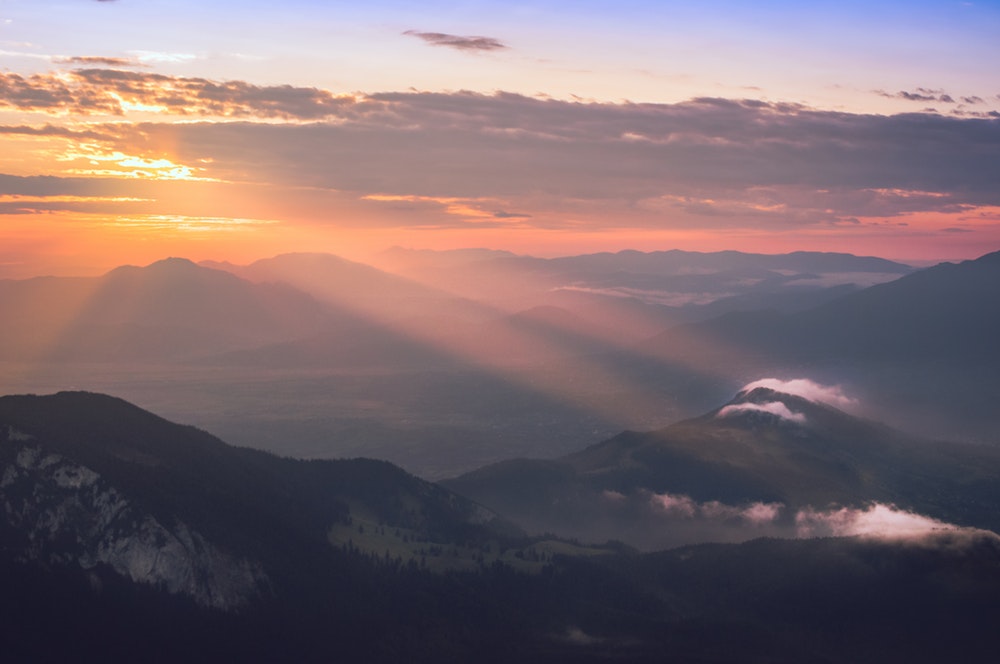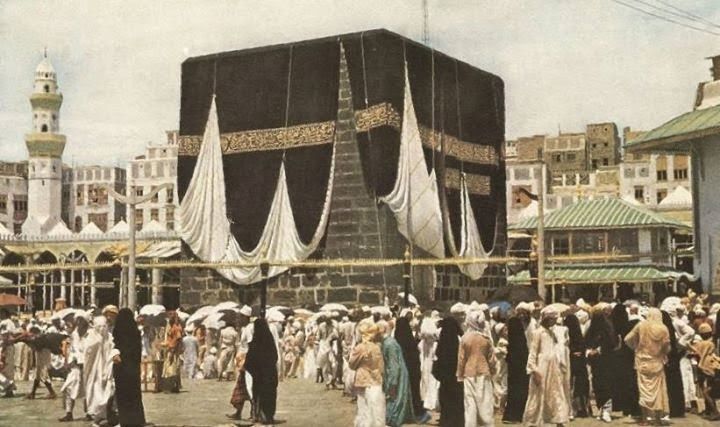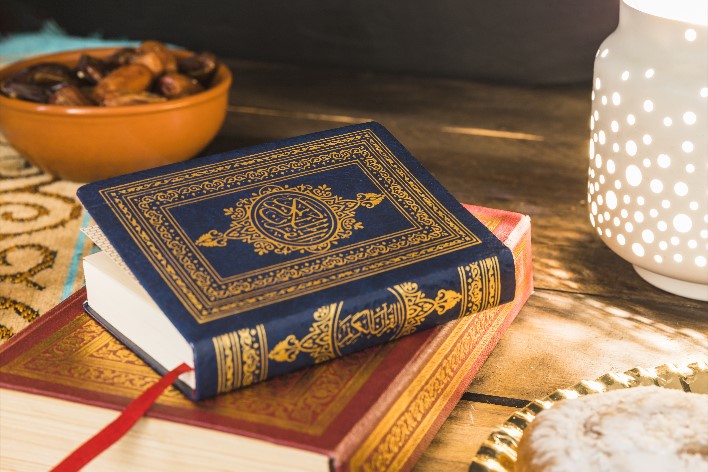Current Section: model

Lesson Definition of the Holy Quran
The Holy Quran
Allah the Exalted and Majestic revealed the Quran upon the best of His creation and the seal of His prophets, Muhammad ﷺ, to guide humanity and bring them out of darkness into light. Allah said: ﴾There has surely come to you from Allah a light and a clear Book (15) through which Allah guides those who seek His pleasure to the ways of peace, and brings them out of the depths of darkness to the light by His Will, and guides them to a straight path (16)﴿ [Al-Maidah:15-16].
Definition of the Holy Quran
The Holy Quran is the miraculous speech of Allah, sent down upon Muhammad ﷺ, the recitation of which is worship, and which opens with Surat Al-Fatihah and concludes with Surat Al-Nas.
The Noble Quran has several names that indicate its honor and virtue. Some of its names include:
The Revelation of the Noble Quran
The Quran was sent down upon the Messenger ﷺ for the first time during the Night of Decree in the month of Ramadan. Allah the Exalted says: ﴾Indeed, We sent it [i.e., the Qur’ān] down during the Night of Decree﴿ [Al-Qadr:1]. Allah also says: ﴾The month of Ramaḍān [is that] in which was revealed the Quran: a guidance for the people and clear proofs of guidance and a Criterion﴿ [Al-Baqarah:185]
The one who revealed the Quran from Allah the Exalted to the Prophet ﷺ was the archangel Gabriel (peace be upon him): one of the closest and most honorable angels. Allah the Exalted said about the Quran: ﴾It is surely a revelation from the Lord of the Worlds (192) The Trustworthy Spirit [i.e., Gabriel] has brought it down (192) Upon your heart, [O Muhammad] - that you may be of the warners - (194) In a clear, Arabic tongue﴿ [Ash-Shu'ara:192-195].

And the first thing that was revealed from the Quran on the Prophet ﷺ was the first five verses from Surat Al-Alaq, which is the Exalted says: ﴾Recite in the name of your Lord who created (1) created man from a clinging clot [of blood] (2) Recite, and your Lord is the most Generous (3) He Who taught by the pen (4)﴿ [Al-Alaq: 1-5].

Then, after that, the Quran was revealed in sections to the Prophet ﷺ at different times in Mecca and Medina over a period of 23 years, in accordance with certain events and occurrences.

Ibn Abbas (may Allah be pleased with him) said: «The Quran was revealed altogether to the lowest heaven during the Night of Decree. Then it was revealed afterwards over a period of 23 years» (Al-Asmaa wa as-Siffat of Al-Bayhaqi 497).

The Surahs (Chapters) of the Holy Quran
There are 114 surahs in the Quran: The first one is called Al-Fatiha and the last one is called An-Nas
The Meccan and Madani Surahs of the Quran
The Quran is divided into 30 Juz and 60 Hizb
Writing and Gathering of the Quran
The Quran's recording and gathering consisted of 3 stages:
The 1st Stage: During the Time of the Prophet ﷺ
During this stage, there emphasis was placed on memorization over writing due to the strength in people's ability to memorize, the speed of memorization, lack of sufficient writers and means of writing. For these reasons, the Quran was not collected in a single book. Rather, whoever would hear a verse from it would memorize it, or write it on whatever was available at the time, such as palm tree parchment, pieces of animal skin, stone faces, or animal shoulder bones. There were numerous reciters at that time.
The 2nd Stage: During the Time of Abu Bakr (may Allah be pleased with him)
In the 12th year of the Hijra, numerous reciters of the Quran were slain during the battle of Yamamah, which led Abu Bakr (may Allah be pleased with him) to order the compilation of the Quran to avoid it being lost.
Zaid bin Thabit, may Allah be pleased with him, narrates: «Abū Bakr sent for me after the slaughter of those who fought at al-Yamāma and ‘Umar b. al-Khattāb was with him. Abū Bakr told me: ‘Umar has come to me and told me that casualties were heavy at al-Yamamah among the Muslims who memorized the Quran, I am afraid that more heavy casualties may take place among the Muslims who know the Qur'an by heart on other battlefields and a large part of the Qur’an may be lost. I ['Umar] think that you [Abu Bakr] should issue instructions that the Qur'an be collected. I said to ‘Umar. How can I do anything that the Messenger of Allah ﷺ did not do? He said: By Allah, it is a good thing. And he kept urging me to do that until Allah opened my heart to it and I came around to 'Umar's point of view. Zaid said: And ‘Umar was sitting with him, not speaking. Abu Bakr said: You are a wise young man and we trust you. You used to write down the revelation for the Messenger of Allah ﷺ, so collect it. Zaid said: By Allah, if they had ordered me to move a mountain, that would not have been more difficult for me than what they instructed me to do of collecting the Qur'an. I said: How can you do anything that the Messenger of Allah ﷺ did not do? He replied: By Allah, this for the better." Abu Bakr continued to follow up with me until Allah opened my heart to what he opened Abu Bakr and Umar's heart to (may Allah be pleased with them). So I searched for the Qur’ān and collected it from leafless palm branches, white stones، and the breasts of men,....The sheets remained with Abū Bakr until Allah took him, then with ‘Umar during his lifetime, then with Hafsa, ‘Umar’s daughter (may Allah be pleased with him)» (Al-Bukhari 4986).
The 2nd Stage: During the Time of Uthman ibn Affan (may Allah be pleased with him)
The territory of the Islamic state expanded during the reign of Uthman bin Affan (may Allah be pleased with him). People of every region began to recite the Quran in the method taught to them by the companions. Due to the multiplicity of ways of reading the Noble Qur’an, conflict was feared, especially for those who did not hear the Quran from the Prophet ﷺ. So Uthman dedicated one copy of the Quran for all people to use, so that people would not differ and dispute over Allah's Book and disperse.
Anas ibn Malik narrated: Hudhaifa bin Al-Yaman came to `Uthman at a time he was fighting the people of Levantine to conquer Amenia and Azerbaijan with the people of Iraq. Hudhaifa was appalled by their differences in recitation so he said to `Uthman, "O Leader of the Believers! Save this nation before they differ about the Book (Qur'an) as Jews and the Christians did before." So `Uthman sent a message to Hafsa saying, "Send us the manuscripts of the Qur'an so that we may create perfect copies and return the manuscripts to you." Hafsa sent it to `Uthman. `Uthman then ordered Zaid bin Thabit, `Abdullah bin Az-Zubair, Sa`id bin Al-As and `AbdurRahman bin al-Harith bin Hisham to rewrite the manuscripts in perfect copies (Al-Bukhari 4987).
The Quran has remained on its compilation until today as agreed upon with a complete and successive consensus between Muslims.



